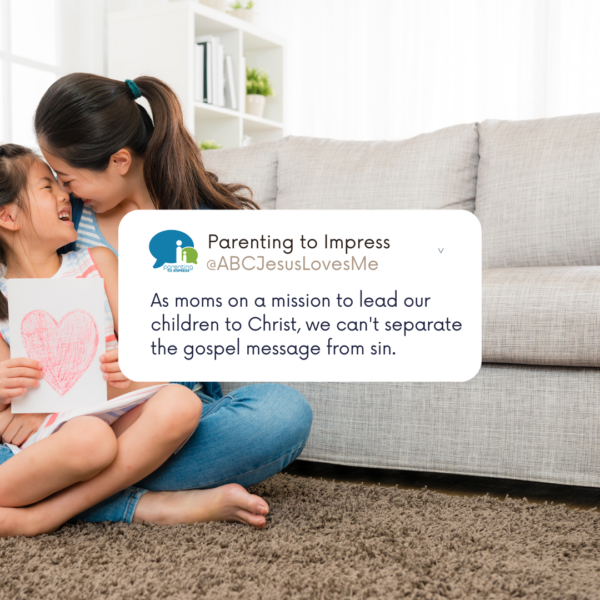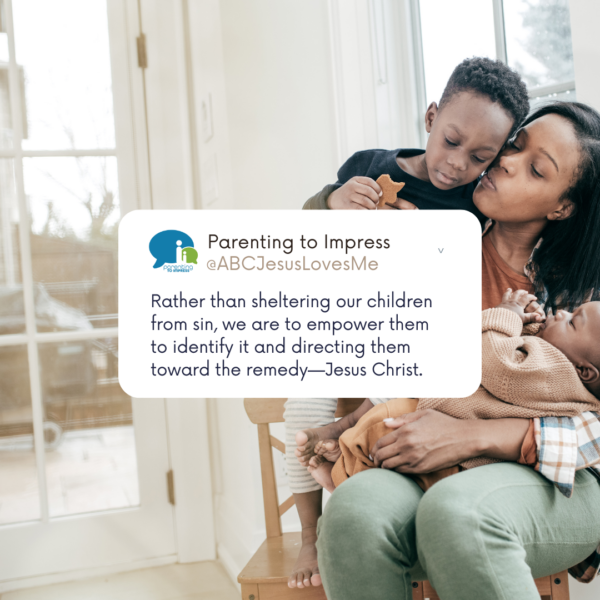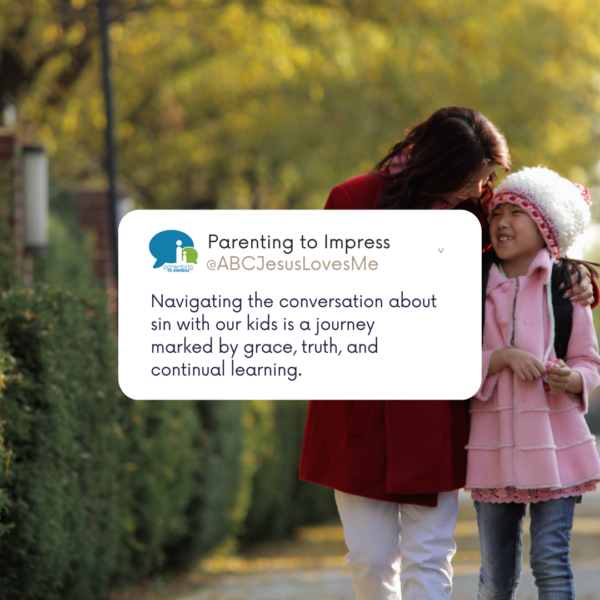We talk to our children about sharing, being kind, and taking turns. But how often do we talk to our children about sin and redemption?
I recently received a heartwarming email from a listener who was encouraged by our Parenting to Impress podcast. She sought insights on discussing sin with her children without casting a shadow of doom and gloom. Is it even possible?

Is Talking about Sin Necessary?
Melanie and I agree—it would be easier if we could sidestep discussing sin, especially with little ones. But as moms on a mission to lead our children to Christ, we can’t separate the gospel message from sin. The foundation of understanding sin is vital for their spiritual journey.
In the ABCJesusLovesMe Curriculum I define sin as the bad choices we make—when we choose our way over God’s way. Even our little precious babies are not exempt; sin entered the world with the fall of humanity. Romans 3:23, “For all have sinned and fall short of the glory of God.”
Understanding that sin resides in us and acknowledging its presence in our world propels us to discuss it with our children. Rather than sheltering our children from sin, we are to empower them to identify it and direct them toward the remedy—Jesus Christ. This begins by teaching children to obey us so that their hearts are bent to obey God.

Teaching Children about Sin
Preschool:
The conversation about sin evolves as our children grow. Even at an early age, begin using the words the Bible uses—sin, disobedience, forgiveness, grace, and mercy. This vocabulary can be used in teachable moments, where conversations about wrong choices and their consequences lead to practical understanding.
Elementary:
In elementary years, move beyond behavior modification, delving into the need for a Savior. Begin asking questions and together unpeel the “onion” on these tough topics. Understand that this is not a one and done, yet layer upon layer of intentionality. These faith conversations will help raise thinking theologians, not blind sheep.
Teens:
As children enter their teens, it’s even more important to model humility and confess our own sins. Melanie’s family uses the ACTS model (Adoration, Confession, Thanksgiving, Supplication) during family conversations to normalize the acknowledgment of sin. Around the dinner table they not only talk about the normal thanksgiving and needs but take time to confess sins in front of each other. This helps children see sin on a level playing field.

Addressing Shame and Emphasizing Grace
Whenever sin is discussed, there is the fear of shame being developed in the child’s heart. But typically, this occurs when extremes are focused on instead of balanced teaching. Shame arises when forgiveness doesn’t follow acknowledgment of sin. The key is to teach the child to acknowledge the sin while continually emphasizing God’s grace and redemption.
Navigating the conversation about sin with our kids is a journey marked by grace, truth, and continual learning. None of us will get it right all the time. But let’s walk this path together, leaning on the God who redeems, restores, and guides us through the beautiful mess of intentional parenting. You’re not alone in this, and together, we can raise children who love God and love others.
#44: A Parent’s Crucial Role in Teaching Sin and Redemption
Listen for more tips or read the transcript.

Hi! Wondering about the job qualifications! Looking for something I can do from home and enjoy!
Yay! You can find the application at http://www.ABCJesusLovesMe.com/links
Please email when finished. 🙂